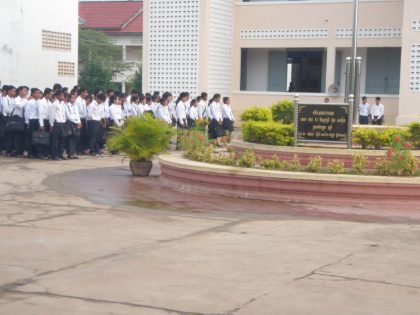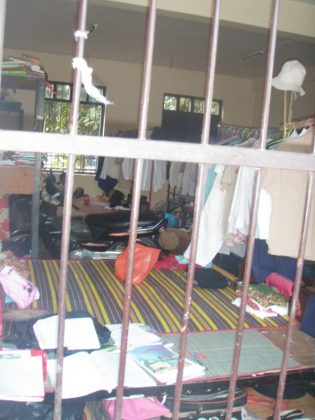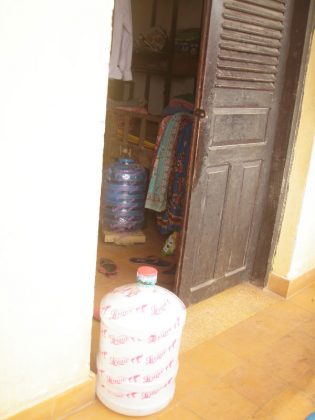 Location
Location
Battambang City, Sangker District, Battambang Province, Cambodia
Community Description
Battambang City is in the provincial capital of Battambang, located 291 kilometers north of Phnom Penh. Situated in the northwest region of Cambodia, Battambang has the main highway (National Road 5) linking Phnom Penh and Thailand. It is the second largest city in Cambodia, and is known as the “Rice Bowl of Cambodia.
In Cambodia, to be eligible to become a lower-secondary school teacher, one must hold a certificate of general secondary education, pass an entrance exam and undertake two-years of training at one of the six regional teacher training centers (RTTC), which are located in Battambang, Prey Veng, Takeo, Kampong Cham, and Kandal provinces, and Phnom Penh.
Upon successful completion of the RTTC training, graduates are awarded a certificate of pedagogical training in two areas of study including mathematics, biology, physics, chemistry, English, home economics, and Khmer literature, qualifying them to teach 7th, 8th and 9th grades. As part of teacher training, there are fourteen weeks of teaching practicum training in total (six weeks in the first year and eight weeks in the second year).
 For the 2009-2010 school year, there were 738 total teacher trainees enrolled at the Battambang RTTC: 363 year 1 (198 female), and 375 year 2 (211 female). For the 2010-2011 school year, there are 711 trainees enrolled: 349 year 1 (178 female), 362 year 2 (198 female). The average age of trainees is about 22.
For the 2009-2010 school year, there were 738 total teacher trainees enrolled at the Battambang RTTC: 363 year 1 (198 female), and 375 year 2 (211 female). For the 2010-2011 school year, there are 711 trainees enrolled: 349 year 1 (178 female), 362 year 2 (198 female). The average age of trainees is about 22.
The teaching staff totals 38. There are 20 non-teaching staff including the Director, two Deputy Directors, and one Academic Director. There are five English Teacher Trainers who work and collaborate directly with the Peace Corps Volunteer placed in the RTTC.
The RTTC Battambang campus, built primarily in the 1960s in the French Colonial style endemic to Battambang City, is made up of 3 classroom buildings, 2 academic administration buildings, 1 building housing a small lower-secondary practice school of slightly less than 100 students, and 2 buildings serving as women’s dormitories. The 2 buildings serving as men’s dormitories are located 500 meters south of the campus, on a separate property.
The student teacher trainees living in the RTTC dorm facilities live with limited access to clean water, without fans and with limited electricity. The state of the bathrooms in all of the women’s and men’s dorms is of particular concern. Together, the women’s dorms, with a total of 16 residential rooms, house 251 trainees, and about 12 female faculty/staff and their family members.
 Dorm #2 houses about 126 female trainees in 8 rooms. Of the two bathrooms serving this building, the downstairs bathroom is the only one with running water or working toilets–of the four in-ground squatty toilets, only two are in working condition. The only water available in this bathroom flows into a 2,000 gal above-ground open cistern in this ground floor bathroom.
Dorm #2 houses about 126 female trainees in 8 rooms. Of the two bathrooms serving this building, the downstairs bathroom is the only one with running water or working toilets–of the four in-ground squatty toilets, only two are in working condition. The only water available in this bathroom flows into a 2,000 gal above-ground open cistern in this ground floor bathroom.
High volume use is an understatement — for the 126 young women use the water from this large basin for bathing, washing clothes, flushing the two toilets, hand washing, brushing teeth, and general cooking. Each week, residents who can afford it, buy a 10-gallon bottle of drinking water for their dorm room use, costing a little over $2 U.S.
This water and bathroom situation creates a precarious health and living circumstances for these young future teachers. Year-round complaints of headaches, colds, fevers and a general poor health within this RTTC female teacher trainee population is considered related to this water and living situation and is discussed frequently by the teacher trainers and the school administration.
Project Description
This project is to (1) repair the upstairs water source, and (2) repair the downstairs and upstairs toilets in the building serving female trainees.
The work will be done by skilled technicians and school staff. Project funds will be used to purchase materials.
A future project is to install two face bowls in each of the upstairs and ground floors of each of the women’s and men’s dorms, that residents can easily access outside of their dorm bathrooms, to wash their hands and brush their teeth.
Project Impact
251 female student teacher trainees living in women’s dorm #2 will benefit from the project.
Peace Corps Volunteer Directing Project
Darlene Grant
Comments
This project addresses a critical need for water and sanitation for these future teachers. The improved conditions will improve the health and wellbeing of the residents, and will indirectly impact upon those with whom they come in contact.
Dollar Amount of Project
$500.00
Donations Collected to Date
$500.00 + additional amounts for future projects.
Dollar Amount Needed
$0.00 – This project has now been fully funded through the generosity of friends and family of Peace Corps Volunteer Darlene Grant.
We encourage others to continue to donate using the Donate button below, and we will notify Darlene of your donation. Additional funds will be used to fund the next project by Darlene and/or those of other PCVs in the country.
This project has been finished. To read about the conclusion of the project, CLICK HERE.